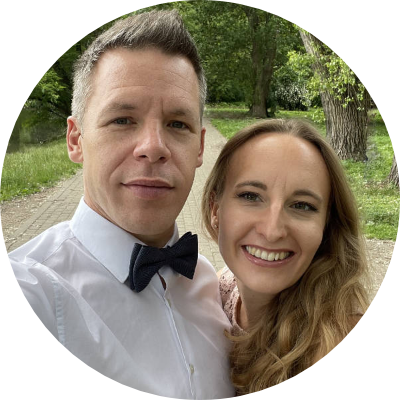Being able to effectively communicate with your partner is extremely important. It helps avoiding conflicts, prevents misunderstandings, allows for trust to build between you and your significant other, and deepens your emotional connection.
It can simplify your relationship and make it a lot more enjoyable.
So how do you effectively communicate with your partner?
From a scientific point of view, communication is nothing more than a transfer of information between two people’s brains. Since our brains don’t come equipped with Bluetooth or wifi, the fastest communication channel available to us humans is speaking and listening.
The person speaking is sending the information out of their brains and the person listening is receiving it.
One of the biggest issues preventing couples from communicating effectively with each other is their inability to listen.
It used to be the biggest problem in our relationship too. We fought a lot about it and it took us about a year and a half to figure it out.
In this article, I’m going to share with you three simple hacks, that both Gabriel and I use on a daily basis to communicate effectively with one another.
1. Reflective Listening
The first necessary step in order for communication to happen is letting your partner know you have received the information that they just gave you.
In other words, you have to let them know you heard what they just said. The purpose of reflective listening is making your partner feel heard.
In my personal experience, the easiest and by far the most effective way to make another person feel heard is repeating what they just said word for word.
Reading this you’re most probably thinking “whaaat?!”. I know it just seems like an incredibly silly idea. But it works!
In order to illustrate how this silly but powerful hack works, I will give you some examples of our conversations with Gabriel:
Example one:
Karolina: “Hey, how was your day?”
Gabriel: “Hey, ugh I’m so irritated coz the sink in our office kitchen was clogged”
Karolina: “You’re irritated coz the sink in your office kitchen was clogged?”
Gabriel: “Yeah, it kept on making really loud sucking noises all day long”
Karolina: “Uhh, it was making loud sucking noises all day long?”
Gabriel: “Yeah, it was incredibly annoying”
Example two:
Gabriel: “What’s up?”
Karolina: “I feel so crap”
Gabriel: “You feel crap?”
Karolina: “Yeah, my back is hurting and I just feel so depressed”
Gabriel: “Your back is hurting and you feel depressed?”
Karolina: “Yeah, think I’m about to get my period. Periods suck!”
Gabriel: “Not that I would know, but yeah! Periods suck!”
As you can see in the examples above repeating what your partner said word for word opens them up allows them to express more of what they are feeling.
It seriously worked wonders for us! So even though it might seem silly, try it out and see for yourself!
This simple hack has its limits though. You can’t just continuously repeat what your partner is saying to you. If you do it too much, they’ll feel like you’re mocking them.
It is a really good tool at the beginning of a conversation, it will open your partner up. But if you want to keep the communication going you gotta move to step two:
2. Validate Their Feelings
Let’s face it, validation is something everybody craves really desperately. We all want to hear that what we feel matters, that it’s important and that we’re right to feel this way.
Validating your partner’s feelings is a really important step for effective communication. It lets them know that you have their back It builds trust between the two of you and opens them up even more.
The easiest most effective way for validating another person’s feelings is in my experience agreeing with them.
In our relationship, we often say things like “that’s so true” or “you’re right” etc to validate the other one’s feeling in a conversation.
In order to illustrate how validation works I will expand the dialogue in one of the already mentioned examples:
Gabriel: “What’s up?”
Karolina: “I feel so crap”
Gabriel: “You feel crap?”
Karolina: “Yeah, my back is hurting and I just feel so depressed”
Gabriel: “Your back is hurting and you feel depressed?”
Karolina: “Yeah, think I’m about to get my period. Periods suck!”
Gabriel: “Not that I would know, but yeah! Periods suck!”
Karolina: “Why do I have to go through this crap every single month?! Nature is so unfair!”
Gabriel: “You’re right, nature is really unfair!”
Karolina: “It really is unfair! Thanks… That made me feel a bit better”
Everybody is so validation hungry, that you’re just agreeing with your partner can be a huge deal to him/her.
In my parents’ relationship, they validated each other so little, that when my dad would say to my mum “you’re right!” she would jokingly pull out her phone and say “can you repeat this? I gotta record this!”
In our relationship with Gabriel, we validate each other a lot. Phrases like “you’re right” or “that’s so true” are sort of a default response to anything that the other person is saying.
So much so that sometimes when Gabriel says something to me and I’m totally distracted and don’t register a word he just said I initially respond with “you’re so right!” and then quickly add “Can you repeat everything you just said? I was totally distracted..” He does that too. We laugh about it a lot.
Being generous with validation is a really good habit to develop in your relationship. You agreeing with your partner proves to them that you’re on their side and that you have their back.
Everybody is so validation hungry, that even if your “you’re right!” feels a bit fake, chances are your partner won’t even notice that. Seriously, try it out!
3. Empathize
My third and final hack for effective communication in a relationship is empathy.
Empathizing is all about putting yourself in your partner’s shoes, imagining how you’d feel in this situation and what you’d need to hear, and using it to make your partner feel better.
In a way, empathy is like giving kindness. It’s an active effort of taking care of your partner’s needs.
To illustrate how empathy is the final step of effective communication I will continue to expand the same example from before. This time I will divide it into the three steps: Active listening, Validation, and Empathy
Reflective Listening:
Gabriel: “What’s up?”
Karolina: “I feel so crap”
Gabriel: “You feel crap?”
Karolina: “Yeah, my back is hurting and I just feel so depressed”
Gabriel: “Your back is hurting and you feel depressed?”
Karolina: “Yeah, think I’m about to get my period. Periods suck!”
Gabriel: “Not that I would know, but yeah! Periods suck!”
Validation:
Karolina: “Why do I have to go through this crap every single month?! Nature is so unfair!”
Gabriel: “You’re right, nature is really unfair!”
Karolina: “It really is unfair! Thanks… That made me feel a bit better”
Empathy:
Gabriel: “Makes sense you feel depressed, it’s crazy you have to go through this every month..”
Karolina: “Yeah, it really is crazy… This month is particularly bad though”
Gabriel: “It really sucks that this month is particularly bad… Is there anything I can get you that would help? Hot water bottle?”
Karolina: “You’re the best! 💗”
This third and final step is actually the first time when you can try to make your partner feel better and offer them your help.
When communicating with a loved one who is upset, people tend to jump straight into trying to help them right away. It is a mistake that I have made many times too.
That’s why it is important that you use these steps in the right order. You start by making your partner feel heard, then validate their feelings and only then you can move onto empathy.
There is no point in validating another person’s feelings if they don’t feel heard first. Similarly, there is no point in empathizing with someone who doesn’t feel like you agree with them.
The lack of effective communication is a common problem in relationships. It used to be a big problem in our relationship too. These three hacks really helped feel closer and more connected. We still use all of them on a daily basis.
In case you’re looking for more ways to improve communication and feel more connected in your relationship, be sure to check out our Free 4-Day Relationship Challenge.
It’s been designed to help women understand the typical mistakes and misunderstandings that lead to relationship problems. You’ll receive a series of four fun challenges to help you fix things and feel closer to your partner.
Click here to start your Free 4-Day Relationship Challenge.
If you decide to try out my hacks be sure to let me know how it went in the comments below!
Karolina
- How to Get a Dismissive Avoidant to Stop Rejecting You - 5. July, 2025
- Why Avoidants Don’t Worry About Losing You – And How That’s a Huge Mistake - 12. June, 2025
- 3 Strategies for When an Avoidant Partner Pulls Away - 12. June, 2025



